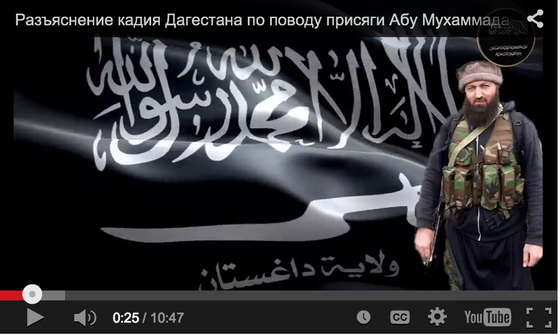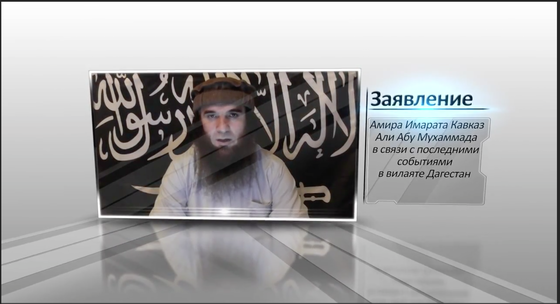Earlier this month, Rustam Asilderov, a senior jihadist in Dagestan, released a video in which he pledged allegiance (bayat) to the head of the Islamic State, Abu Bakr al Baghdadi. Asilderov had been the leader of Vilayat Dagestan, which is the Dagestani province of the Islamic Caucasus Emirate (ICE), an al Qaeda-linked organization that has long fought the Russian government.
Asilderov explained that he would have sworn bayat to Baghdadi sooner, but he was hoping the overall emir of ICE, Ali Abu Muhammad al Dagestani (a.k.a. Aliaskhab Kebekov), would follow suit and swear his fealty to Baghdadi as well.
However, Asilderov finally concluded that the head of ICE was not going to join the ranks of Baghdadi's international followers. So he decided to break off on his own. Asilderov claimed in his video that a "majority" of jihadists in Dagestan share his view and his bayat to Baghdadi was "on behalf of the mujahideen of the Dagestan province."
The move provoked a fierce backlash.
A few days after Asilderov's video, Ali Abu Muhammad released his own. Ali Abu Muhammad's 16-minute video has been posted a number of jihadist websites, including the site for Vilayat Dagestan and the Kavkaz Center, which has also posted excerpts in English.
Ali Abu Muhammad describes Asilderov's move as a "treacherous act," which has forced him to replace Asilderov as the emir of the Dagestan province with another "brother."
"We respected this brother. We accepted him. We did not expect such a treacherous act by him," Ali Abu Muhammad says in reference to Asilderov, according to a translation obtained by The Long War Journal.
The ICE emir says one can "turn a blind eye to many things," but not "treachery," and if Asilderov wanted to fight for Baghdadi then he should have left for Iraq and Syria. Instead, according to Ali Abu Muhammad, Asilderov has "caused a split among the mujahideen."
Ali Abu Muhammad urges the people of Dagestan not to help Asilderov and his followers, as they have "betrayed" their ICE brethren and "defected" to Baghdadi's side. Ali Abu Muhammad challenges Asilderov to a debate concerning who is right, Baghdadi or Ayman al Zawahiri and Mullah Omar, the heads of al Qaeda and the Taliban, respectively.
The ICE head argues that Asilderov lacks basic knowledge of sharia law, so he cannot have an informed opinion one way or another. "This brother does not quote the Koran," or the hadiths, or the "statements by scholars in any of his addresses," Ali Abu Muhammad says. "Is this not enough? Does this not prove and point to the fact that this man lacks basic knowledge [of the sharia]?"
In addition, Ali Abu Muhammad mentions another Dagestani leader who swore allegiance to Baghdadi, but his assessment is more forgiving. "I know this brother as a good man," Ali Abu Muhammad says, adding that this other jihadist should "reconsider his decision."
Ali Abu Muhammad's video was released just a couple of days after another ICE official criticized Asilderov's decision to switch allegiances. Muhammad Abu Usman, ICE's chief sharia judge in Dagestan, released an audio message saying that neither he, nor Ali Abu Muhammad, had been consulted before Asilderov made his announcement. Abu Usman also criticized Asilderov's lack of sharia knowledge.
"As a result," Abu Usman claimed, Asilderov's "decision was adopted at Satan's instigation and this is nothing but following one's passion."

|
| Abu Usman, ICE's top sharia judge in Dagestan, has harshly criticized those who have joined the Islamic State. |
In a separate message released earlier in the month, Abu Usman explained that Ali Abu Muhammad "has not allowed anyone to swear allegiance to the Islamic State as far as they accuse Muslims of disbelief, accept killing of Muslims and do not listen to scholars."
Abu Usman's messages have been promoted on Twitter by officials in the Al Nusrah Front, an official al Qaeda branch in Syria that has fought against the Islamic State since last year.
The messages from Ali Abu Muhammad and Abu Usman show that the ICE is clearly concerned about the Islamic State's sway over a number of ICE fighters. It is not clear how many jihadists this entails, but the coming months will undoubtedly shed additional light on the internal dissent.
While Asilderov claims that a "majority" of Dagestani jihadists agree with his decision to join the Islamic State, Kavkaz Center argues that this is not the case.
But other ICE commanders have defected to the Islamic State as well, according to Kavkaz Center.
The defectors can either flee for Iraq and Syria, or attempt to start their own breakaway faction in Dagestan and elsewhere under the Islamic State's auspices.
ICE emir continues to support al Qaeda, Taliban
Ali Abu Muhammad, who succeeded Doku Umarov as the emir of ICE in March 2014, has steadfastly supported al Qaeda and the Taliban throughout the controversy over the Islamic State's rise. He has continued to do so even as some Chechen jihadists, including Abu Omar al Shishani, have risen to prominent positions within Abu Bakr al Baghdadi's organization.
In 2013, Abu Omar al Shishani helped found Jaish al-Muhajireen wal Ansar, or the Army of the Emigrants and Helpers, before officially joining the Islamic State.
Jaish al-Muhajireen wal Ansar, which is led by Chechens but includes other fighters as well, remains loyal to Ali Abu Muhammad. And the group tries to remain neutral in the conflict between the Islamic State and its jihadist rivals in Syria. [See LWJ report, State Department adds Chechen, Moroccan-led jihadist groups to terrorist list.]
In late June, Ali Abu Muhammad released a video in which he discussed the efficacy of suicide bombings and the necessity of avoiding civilian casualties. Ali Abu Muhammad referred to Ayman al Zawahiri as "our leader" in the video and noted that Zawahiri has "urged rebels to avoid places where civilians gather."
The ICE emir was likely referencing the jihadist guidelines issued by al Qaeda under Zawahiri's direction. Al Qaeda is attempting to limit the jihadists' civilian casualties in the Muslim majority world as it tries to build a broader base of popular support.
In September, Ali Abu Muhammad released another video addressing Zawahiri and other leading jihadist ideologues as the "scholars of the ummah," or international community of Muslims. All of the other scholars addressed by the ICE head in the video back al Qaeda in its rivalry with the Islamic State. The other scholars included: Abu Muhammad al Maqdisi, Hani al Sibai, Tariq Abd al Halim, and Abu Qatada al Filistini, all of whom have criticized Baghdadi.
Ali Abu Muhammad referred to the "scholars" collectively as "our valued brothers, the loved ones, the delights of our eye." It is likely that he addressed them in these glowing terms as a reply, of sorts, to the Islamic State and its supporters, who have been accused of slandering the veteran jihadist ideologues for not supporting the Islamic State.
"We rely on you in our jihad and follow you as our paragon," Ali Abu Muhammad said, addressing the jihadist leaders. "Therefore, do not forget us in your provision of advice and guidance whenever this is feasible and possible for you."
In late September and early October, Ali Abu Muhammad played a leading role in promoting a jihadist truce initiative in Syria. He joined some of the same ideologues he had praised in publishing "An Initiative and Call for a Ceasefire Between Factions in Syria." The proposed truce aimed to take advantage of the America-led bombing campaign in Syria to promote a ceasefire between the Islamic State and its foes. The Islamic State did not formally agree to such a deal. [See LWJ report, Pro-al Qaeda ideologues propose truce between Islamic State, rivals.]
In their criticisms of Asilderov, both Ali Abu Muhammad and Abu Usman, ICE's top sharia judge in Dagestan, refer to the jihadists' scholarly consensus concerning the Islamic State's "caliphate." They argue that Asilderov and others have ignored the opinions of leading jihadist thinkers in swearing bayat to Baghdadi.
